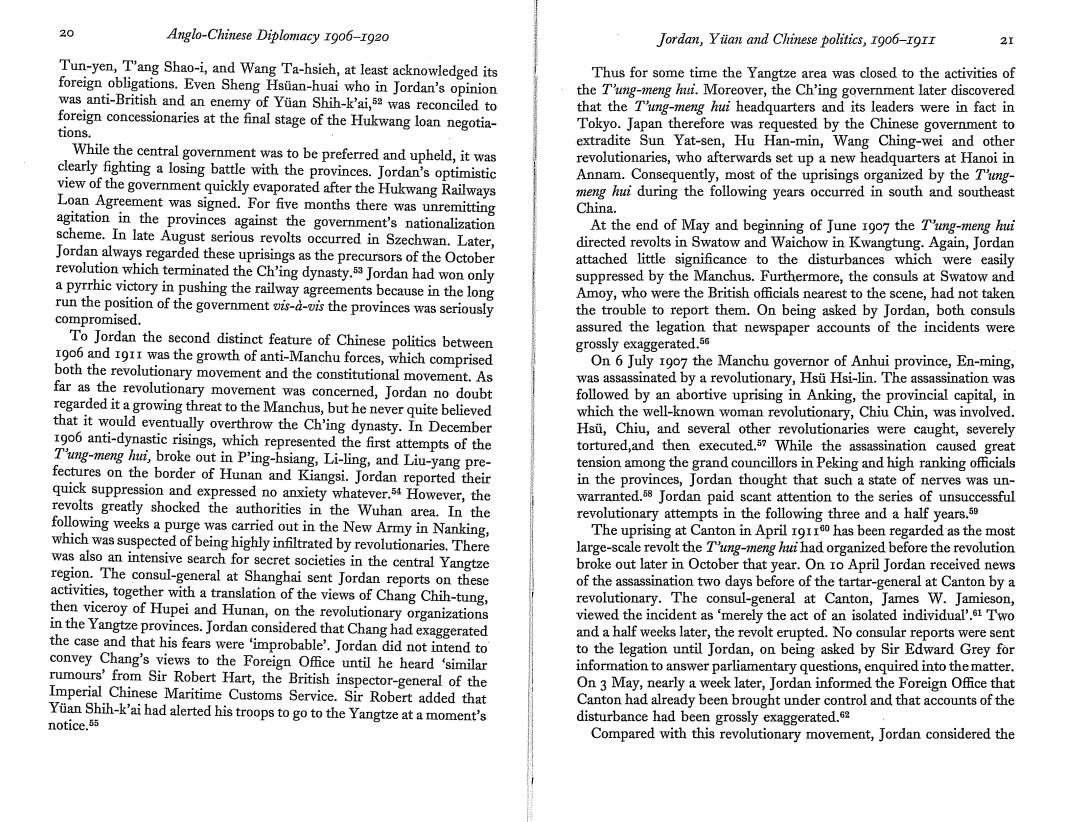正在加载图片...

20 Anglo-Chinese Diplomacy 19o6-1920 Jordan,Yiian and Chinese politics,I9o6-I9II 21 Tun-yen,T'ang Shao-i,and Wang Ta-hsieh,at least acknowledged its foreign obligations.Even Sheng Hsuan-huai who in Jordan's opinion Thus for some time the Yangtze area was closed to the activities of was anti-British and an enemy of Ytian Shih-k'ai,52 was reconciled to the T'ung-meng hui.Moreover,the Ch'ing government later discovered foreign concessionaries at the final stage of the Hukwang loan negotia- that the T'ung-meng hui headquarters and its leaders were in fact in tions. Tokyo.Japan therefore was requested by the Chinese government to While the central government was to be preferred and upheld,it was extradite Sun Yat-sen,Hu Han-min,Wang Ching-wei and other clearly fighting a losing battle with the provinces.Jordan's optimistic revolutionaries,who afterwards set up a new headquarters at Hanoi in view of the government quickly evaporated after the Hukwang Railways Annam.Consequently,most of the uprisings organized by the Tung- Loan Agreement was signed.For five months there was unremitting meng hui during the following years occurred in south and southeast China. agitation in the provinces against the government's nationalization scheme.In late August serious revolts occurred in Szechwan.Later, At the end of May and beginning of June 1go7 the T'ung-meng hui Jordan always regarded these uprisings as the precursors of the October directed revolts in Swatow and Waichow in Kwangtung.Again,Jordan attached little significance to the disturbances which were easily revolution which terminated the Ch'ing dynasty.5 Jordan had won only a pyrrhic victory in pushing the railway agreements because in the long suppressed by the Manchus.Furthermore,the consuls at Swatow and Amoy,who were the British officials nearest to the scene,had not taken run the position of the government vis-d-vis the provinces was seriously compromised. the trouble to report them.On being asked by Jordan,both consuls To Jordan the second distinct feature of Chinese politics between assured the legation that newspaper accounts of the incidents were 1go6 and IgII was the growth of anti-Manchu forces,which comprised grossly exaggerated.56 On 6 July Igo7 the Manchu governor of Anhui province,En-ming, both the revolutionary movement and the constitutional movement.As was assassinated by a revolutionary,Hsti Hsi-lin.The assassination was far as the revolutionary movement was concerned,Jordan no doubt followed by an abortive uprising in Anking,the provincial capital,in regarded it a growing threat to the Manchus,but he never quite believed that it would eventually overthrow the Ch'ing dynasty.In December which the well-known woman revolutionary,Chiu Chin,was involved. 1go6 anti-dynastic risings,which represented the first attempts of the Hsu,Chiu,and several other revolutionaries were caught,severely T'ung-meng hui,broke out in P'ing-hsiang,Li-ling,and Liu-yang pre- tortured,and then executed.57 While the assassination caused great fectures on the border of Hunan and Kiangsi.Jordan reported their tension among the grand councillors in Peking and high ranking officials in the provinces,Jordan thought that such a state of nerves was un- quick suppression and expressed no anxiety whatever.54 However,the revolts greatly shocked the authorities in the Wuhan area.In the warranted.58 Jordan paid scant attention to the series of unsuccessful revolutionary attempts in the following three and a half years.50 following weeks a purge was carried out in the New Army in Nanking, which was suspected of being highly infiltrated by revolutionaries.There The uprising at Canton in April roIro has been regarded as the most large-scale revolt the T'ung-meng hui had organized before the revolution was also an intensive search for secret societies in the central Yangtze broke out later in October that year.On Io April Jordan received news region.The consul-general at Shanghai sent Jordan reports on these activities,together with a translation of the views of Chang Chih-tung, of the assassination two days before of the tartar-general at Canton by a then viceroy of Hupei and Hunan,on the revolutionary organizations revolutionary.The consul-general at Canton,James W.Jamieson, viewed the incident as 'merely the act of an isolated individual'.61 Two in the Yangtze provinces.Jordan considered that Chang had exaggerated the case and that his fears were 'improbable'.Jordan did not intend to and a half weeks later,the revolt erupted.No consular reports were sent convey Chang's views to the Foreign Office until he heard 'similar to the legation until Jordan,on being asked by Sir Edward Grey for information to answer parliamentary questions,enquired into the matter. rumours'from Sir Robert Hart,the British inspector-general of the On 3 May,nearly a week later,Jordan informed the Foreign Office that Imperial Chinese Maritime Customs Service.Sir Robert added that Yuan Shih-k'ai had alerted his troops to go to the Yangtze at a moment's Canton had already been brought under control and that accounts of the notice.55 disturbance had been grossly exaggerated.62 Compared with this revolutionary movement,Jordan considered the